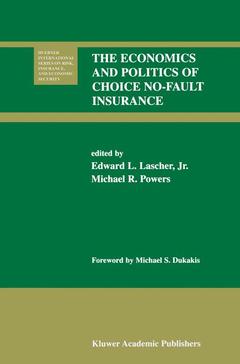The Economics and Politics of Choice No-Fault Insurance, Softcover reprint of the original 1st ed. 2001 Huebner International Series on Risk, Insurance and Economic Security Series, Vol. 24
Langue : Anglais
Coordonnateurs : Lascher Edward L. Jr., Powers Michael R.

In recent years, choice no-fault has emerged as a popular but controversial proposal for addressing the problem of high automobile insurance rates. Choice plans offer consumers the option of a lower-cost insurance policy with restrictions on filing lawsuits or a higher-cost policy with full tort rights. Some American states have implemented choice programs, and major federal choice legislation is now pending in the United States Congress.
Choice no-fault has caught the attention of policy makers, the insurance industry, and academics. Until now, however, no single book has pulled together the available research on the topic. The Economicsand Politics of Choice No-Fault Insurance fills that gap. Edited by scholars from different disciplines, each of whom has written extensively on automobile insurance issues, the book includes some of the best work in the area. Former Massachusetts Governor and presidential candidate Michael S. Dukakis wrote the foreword.
Contributors include University of Virginia Law Professor Jeffrey O'Connell, widely considered the `father of no-fault,' as well as authors of the influential RAND study of the potential effects of choice no-fault on insurance rates. The book chapters, most of which were written especially for this volume, cover topics ranging from the impact of choice no-fault on accidents and driving behavior, to the effects of choice on medical care usage, to alternative approaches for resolving accidents involving both `no-fault' and `tort' electors, to the political feasibility of choice legislative proposals. Emphasis on the potential advantages of choice no-fault is balanced by consideration of possible ill effects.
Choice no-fault has caught the attention of policy makers, the insurance industry, and academics. Until now, however, no single book has pulled together the available research on the topic. The Economicsand Politics of Choice No-Fault Insurance fills that gap. Edited by scholars from different disciplines, each of whom has written extensively on automobile insurance issues, the book includes some of the best work in the area. Former Massachusetts Governor and presidential candidate Michael S. Dukakis wrote the foreword.
Contributors include University of Virginia Law Professor Jeffrey O'Connell, widely considered the `father of no-fault,' as well as authors of the influential RAND study of the potential effects of choice no-fault on insurance rates. The book chapters, most of which were written especially for this volume, cover topics ranging from the impact of choice no-fault on accidents and driving behavior, to the effects of choice on medical care usage, to alternative approaches for resolving accidents involving both `no-fault' and `tort' electors, to the political feasibility of choice legislative proposals. Emphasis on the potential advantages of choice no-fault is balanced by consideration of possible ill effects.
Foreword; M.S. Dukakis. Acknowledgments. I: Background. 1. An Introduction to Choice No-Fault; E.L. Lascher, Jr., M.R. Powers. 2. Choice No-Fault Insurance: Efficiency and Equity; E.L. Lascher, Jr., M.R. Powers. II: Economics and Practice. 3. The Effects of Choice Auto Insurance on Costs and Compensation; S.J. Carroll, A.F. Abrahamse. 4. The Case against Auto Choice; B. Kabler. 5. The Effect of No-Fault Auto Insurance on Driver Behavior and Auto Accidents in the United States; D.S. Loughran. 6. Auto Insurance Claims in New Jersey and Pennsylvania; J.-H. Yeh, J.T. Schmit. 7. Determinants of the Selection of Full or Limited Tort Auto Insurance in Pennsylvania: An Empirical Analysis; L. Regan. III: History and Politics. 8. Giving Motorists a Choice between Fault and No-Fault Insurance; J. O'Connell, R.H. Joost. 9. Equity in Automobile Insurance: Optional No-Fault; M.R. Powers. 10. Auto Choice: Impact on Cities and the Poor; D. Miller. 11. More for Less under Auto Choice; P. Kinzler, J. O'Connell. 12. The Policital Feasibility of Choice No-Fault Insurance; E.L. Lascher, Jr. Index.
Date de parution : 10-2012
Ouvrage de 344 p.
15.5x23.5 cm
Disponible chez l'éditeur (délai d'approvisionnement : 15 jours).
Prix indicatif 105,49 €
Ajouter au panierDate de parution : 08-2001
Ouvrage de 344 p.
15.5x23.5 cm
Thèmes de The Economics and Politics of Choice No-Fault Insurance :
Mots-clés :
© 2024 LAVOISIER S.A.S.
